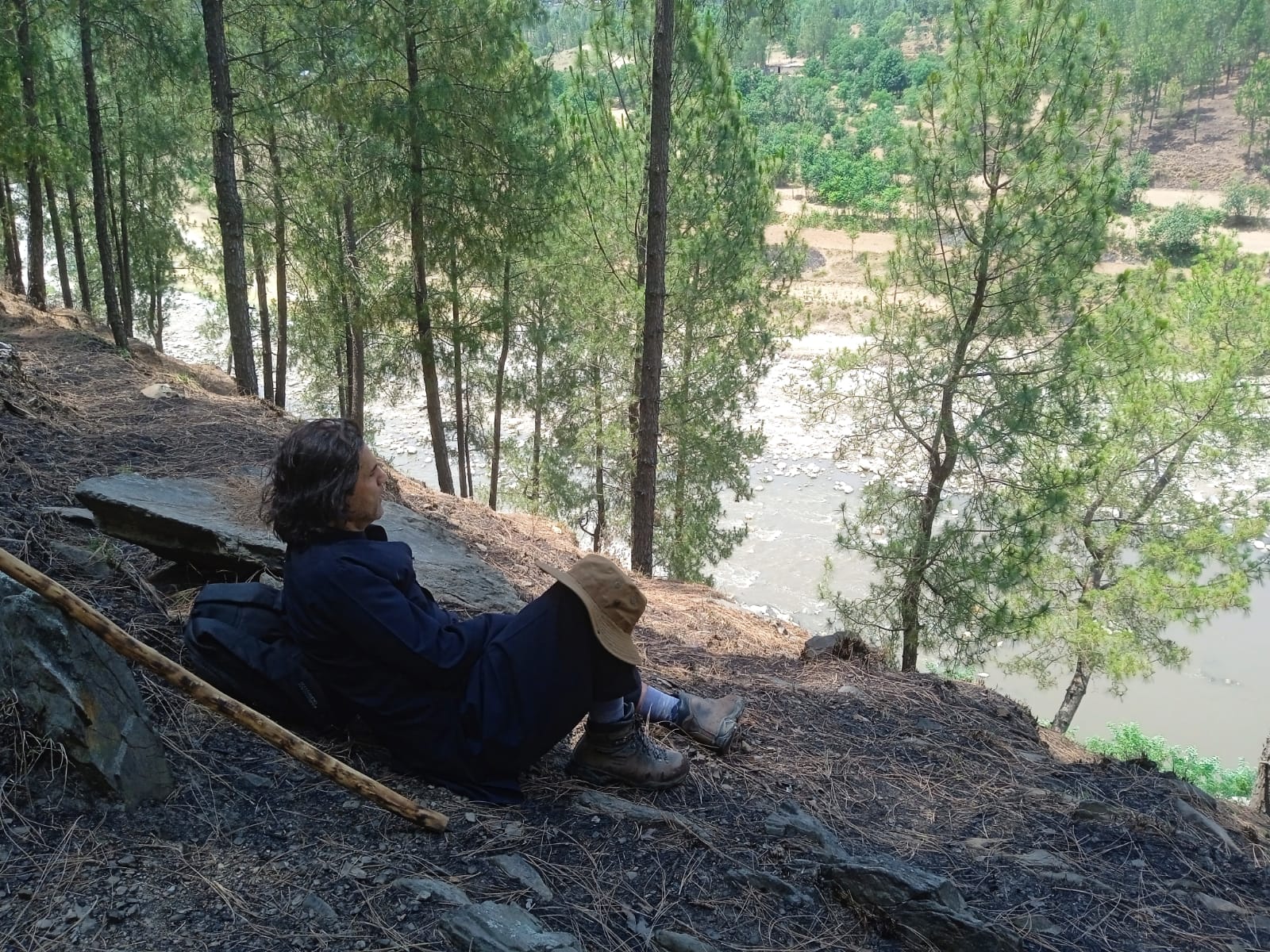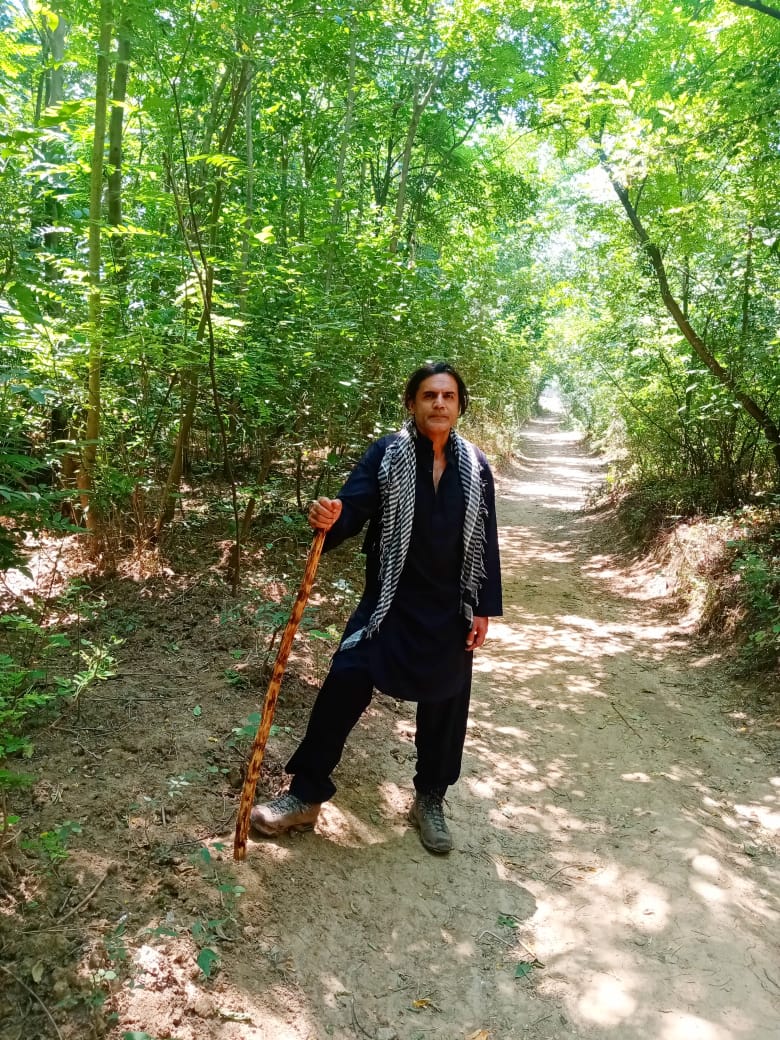by Wajahat malik
In 2006 I had a terrible paragliding crash. My glider collapsed and I plunged to the ground from a height of about 300 ft. I nearly died in that accident. As I lay on the hospital bed for days, with broken bones, stiff as a cardboard, I came up with the idea of going on a walkabout in the style of the Tibetan Lama, one of the main characters from the famous novel Kim, who walked from Lhasa to Lahore looking for a sacred river. Only, I will do the journey in reverse, that is walk from Lahore to Lahsa disguised as a dervish, equipped with a wooden staff and a begging bowl, living on the kindness of people during the course of my journey.
The idea of walking from Lahore to Lahsa never materialised, but the thought stayed with me. A few weeks ago, I came upon a piece of news on social media that talked about a Spanish man who had walked from Spain to Hunza valley. It took him 15 months to reach Pakistan. He was walking the earth along with a Turkish couple who had joined him somewhere along his way and now the trio were going to walk to India and beyond.
The news inspired me and rekindled the flame of going on a Dervish roam. In order to test the waters, I decided to walk for two days in my home town valley of Mansehra in the mountainous Hazara region of Sarhad province, along with a childhood friend named Mazhar.

The plan was to walk from Khaki, a small town situated on the banks of river Siran to the village of Kehnrian and then next day cross river Siran and finish our walk in my native village of Timber Khola, nestled at the base of Barairi Mountain. The journey was going to take us through hills, pine wooded forests, mountain streams and a few small settlements strewn alongside river Siran.
Early one June morning, with wooden staffs in our hands and a change of clothes on our back we rode a Suzuki van from Mansehra to Khaki. We followed the road from Khaki to Kehnrian, a distance of about 6 Kms. We could see the Siri Mountain towering in the west keeping an eye on Tanawal and Pakhal valleys on its either side, to the north rose the mountain range of Tang Lai and Kohe Bheengra and in between the valley, flowed river Siran once a clean river known for its fish and pristine waters, now relegated to a dirty mountain stream, polluted by sewage and other effluents flowing into its waters from the town and villages along its banks.
After walking for a few kilometres, we left the main road, climbed a small hill and emerged onto the scenic table land, at the far side of which lies the village of Kehnrian. The sun was beating hard as we trudged through fields, walked by mud adobe house, said hello to bewildered school kids and villagers and finally took shelter from the sun in a grove of kikar trees.
Right before we entered the village, we decided to cool off and take a bath in a wooded mountain stream called Sar, where the villagers have built an open-air stone bathhouse. The cold-water bath recharged us and we made it the village before noon.

After eating a hearty lunch that was downed with a few glasses of Lassi, we took a nap and woke up to the sound of thunder in the late afternoon. The rain didn’t fall but the clouds gave us perfect cover to go around for a long walk. We went to the edge of river Siran where I had learnt swimming, where I had gone fishing with my village friends and where I had my first taste of village life and learnt how to appreciate and respect nature.
Next day we woke up early, packed some parathas, chutney and two onions in our packs and started walking along side River Siran. The path we followed led us up the side of a mountain with river trickling down below us, then it took us down to the village Bandi Maira. Wrapped up in our own thoughts, we walked through a beautiful alpine landscape. Walking with the wooden staff in my hand, I imagined myself as a dervish, meandering through the mountains and villages looking for certain wisdom, certain knowledge that was profound and had it be attained by walking the earth.
After walking for a couple of kilometers outside Bandi Maira we came across a small wooden suspension bridge over river Siran. We crossed the bridge to the village of Bela on the other side. From Bela we walked backwards along the course of the river, hopping over the boulders, walking over the white sands of the river, stopping by deep wells dug along its banks by the villagers, drinking the sweet cold water from these wells, resting in the shades of the trees, and stopping by for small talks with the curious villagers who constantly advised us against walking in such hot weather.
After a few hours we finally made it the base of Chitar Kot, a thickly forested mountain that we had to traverse in order to reach our final destination, the beautiful village of Timber Khola.
As we climbed higher through the shaded forest of pine trees, the views got prettier. At some point as we sat down to take a breather and to admire the scenery all around, we heard a thud and saw a big falcon crash about ten feet away from us. We quickly scrambled towards the bird and found it breathing heavily, with a trickle of blood coming out of its beak. Mazhar poured some water in its mouth and rubbed its chest but the falcon didn’t recover and died within a few minutes. I thought I could feel the soul of the bird whispering alongside the pine trees as a gentle breeze picked up and made the pine trees sway and sigh.
It was late afternoon when we reached the crest of Chitar Kot Mountain. The view was incredible. The picturesque Pakhal Valley sprawled for miles below us, ringed with high mountains like Musa Ka Musaala that still had snow on its summit, Pakhal valley is the perfect embodiment of alpine beauty, with its forests, rolling hills, rivers, streams and of course with its four seasons.
After taking in the sights all around we descended to a mountains stream on the other side of the mountain where we had our lunch of Parathas, chutney and onions in a pure dervish style.
As we entered my ancestral village of Timber Khola and walked towards the graveyard to pray at my father’s grave, stray clouds came out of nowhere and a heavy squall of rain drenched us to the bones. As Mazhar and I sheltered from rain a under a grove of olive trees in the graveyard, I realized I had left my wooden staff at the place along the stream where we had lunch.







